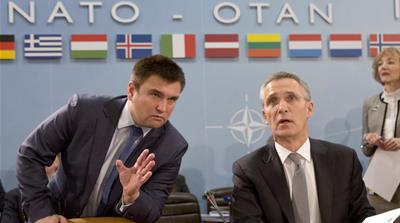
Hungary has ordered a Ukrainian consul to leave the country within 72 hours amid an escalating diplomatic row over Ukraine’s proposed language laws and Hungary’s issuance of passports to ethnic Hungarians in Ukraine.
“Ukraine’s Ambassador to Budapest was summoned to the Ministry of Foreign Affairs and Trade on Thursday and told that one of the consuls working at the Ukrainian Embassy in Budapest must leave Hungary within 72 hours”, Peter Szijjarto, the Hungarian Foreign Minister, said in a press conference on Thursday afternoon.
The move came after Ukraine declared the Hungarian consul in Berehove, a city in the west near the border with Hungary, “persona non grata” and ordered the consul to leave Ukraine within 72 hours on Thursday morning.
Escalating dispute
The expulsions are part of a Ukrainian-Hungarian diplomatic row that has been growing for more than a year.
Ukraine passed a law in September 2017 that banned teaching in minority languages beyond primary school level. Ukraine has sizeable Russian, Romanian, Polish and Hungarian minorities that speak these languages.
Ukraine’s language law particularly angered Hungary, which says the law would cause a “significant proportion” of the roughly 150,000 Hungarians living in Ukraine to “lose the right to use their native language”.
Hungary recently responded to the education law, and a second, proposed, law that would make Ukrainian the only official language, by issuing Hungarian passports to ethnic Hungarians in Ukraine.
A video showing ethnic Hungarians reciting an oath to Hungary during a ceremony to receive their passports in Berehove that surfaced in September has heightened tensions.
The video caused the Ukrainian regional prosecutor’s office to team with the Security Service of Ukraine, the country’s main law enforcement and counterintelligence authority, to investigate whether the circumstances surrounding the passports amounted to potential “high treason”.
The offence is punishable by 12 to 15 years in prison, according to Ukrainian news agency UNIAN.
The Hungarian Foreign Ministry (HFM) said the video “was acquired within the framework of a secret service operation, which goes against all of the written and unwritten rules of diplomacy.”
Russian relations
Peter Kreko, the director of the Political Capital Institute, a Hungarian think-tank, told Al Jazeera the reasoning behind the dispute is multi-faceted.
Kreko said Ukraine is not viewed favourably by many Hungarians. There are also problems with Ukraine’s education law and the country’s response to the passports, he said, but other nations with similar measures enjoy good bilateral relations with Budapest.
“You can’t have Hungarian citizenship if you’re a Slovak citizen,” Kreko observed. “Yet these questions aren’t asked of Slovakia.”
Slovakia amended its citizenship law in 2012 to strip citizens of Slovak citizenship should they apply for a second nationality. The amendment came after Hungary began offering dual citizenship to ethnic Hungarians abroad.
Southern Slovakia is home to about 500,000 ethnic Hungarians.
Kreko said Hungary, which enjoys close relations with Russia, has been the sole NATO member to block Ukrainian integration.
“It’s hard not to see that Hungarian foreign policy makes manoeuvres that seem to fit with the Russian strategy”.
NATO, EU blocked
Ukraine joining NATO, a defensive alliance originally formed to keep the Soviet Union at bay, would afford it further international protections.
Hungary has blocked the NATO-Ukraine Commission, which coordinates efforts to stabilise Ukraine amid the ongoing conflict with pro-Russia separatists in the east, since 2017.
NATO members most recently met in Brussels on October 3 and 4, but Hungary chose to block the commission for a second year.
 |
|
Ukraine hasn’t been able to further its goals of NATO membership for over a year [Virginia Mayo/AP Photo] |
Hungary has also threatened to block Ukraine-European Union integration efforts over the language laws.
Joining these international institutions has been a goal of the Ukrainian government since the 2014 revolution.
While Hungary claims the laws are against EU ideals, some Ukrainians believe they are necessary.
Andreas Umland, a senior fellow with the Institute for Euro-Atlantic Cooperation, a Kyiv-based think-tank that advocates for Ukraine’s joining of both NATO and the EU, told Al Jazeera the language laws were meant to remedy a “paradoxical situation”.
Umland said that under Ukraine’s previous language laws, some Ukrainian students educated in state schools were unable to enter higher education “because of lacking Ukrainian-language proficiency”.
Umland called attention to the quality of Ukrainian-language education in its neighbouring countries, which he said is “inadequate or even negligible”.
There are an estimated 5,000 ethnic Ukrainians living in Hungary.
Neither Hungarian nor Ukrainian authorities responded to Al Jazeera’s request for comment.
Hungary has promised it “will continue to veto” Ukraine’s goals of joining the EU and NATO as long as the country penalises the efforts of ethnic Hungarians to obtain dual citizenship, Foreign Minister Szijjarto said in a statement.












